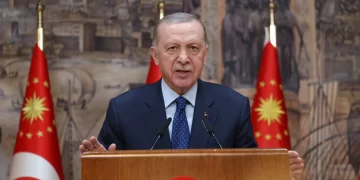UN Secretary General Ban Ki-moon is due to arrive in Turkey on a regional tour focusing largely on the conflict in Syria.
 Mr Ban will visit refugee camps in the south where some 200,000 Syrians have taken refuge from the fighting across the border.
Mr Ban will visit refugee camps in the south where some 200,000 Syrians have taken refuge from the fighting across the border.
He will also hold talks in Ankara with Prime Minister Recep Tayyip Erdogan.
The visit comes as governments continue to warn Damascus not to use chemical weapons against rebel forces.
Mr Ban says that he has written to President Bashar al-Assad to warn that the use of such weapons would have “serious consequences”.
Speaking in the Iraqi capital Baghdad on Thursday, Mr Ban said President Assad should be “brought to justice” if his regime used chemical weapons.
“I have expressed my gravest concerns to (the) government of Syria and I have sent a letter directed to President Assad a couple of days ago,” Ban said.
“I have warned that in any case, if chemical weapons is used, then whoever (it) may be will have to be brought to justice, and it will create serious consequences to those people.”
The BBC’s James Reynolds in Turkey says it is not entirely clear what Syria’s actual capabilities and intentions may be.
Nato recently approved the deployment of Patriot anti-missile batteries along Turkey’s border with Syria.
The long-expected move came amid growing fears that Syria could use chemical weapons.
Nerve gas
The Syrian government is believed to hold such weapons – including mustard gas and sarin, a highly toxic nerve agent – at dozens of sites around the country.
Damascus has never admitted having chemical weapons but said that, if it did, it would never use them against its own people.
One Western intelligence source has told the BBC that, so far, there has been no significant change in the movement or possible deployment of Syria’s chemical weapons stocks.
Washington has warned that the use of chemical weapons in Syria would represent a “red line” that could lead to greater US involvement in the conflict.
The BBC’s Middle East Editor Jeremy Bowen has just arrived in Damascus and says the situation there has deteriorated noticeably since his last visit in January.
(BBC)
















 Afrikaans
Afrikaans Shqip
Shqip አማርኛ
አማርኛ العربية
العربية Հայերեն
Հայերեն Azərbaycan dili
Azərbaycan dili Euskara
Euskara Беларуская мова
Беларуская мова বাংলা
বাংলা Bosanski
Bosanski Български
Български Català
Català Cebuano
Cebuano Chichewa
Chichewa 简体中文
简体中文 繁體中文
繁體中文 Corsu
Corsu Hrvatski
Hrvatski Čeština
Čeština Dansk
Dansk Nederlands
Nederlands English
English Esperanto
Esperanto Eesti
Eesti Filipino
Filipino Suomi
Suomi Français
Français Frysk
Frysk Galego
Galego ქართული
ქართული Deutsch
Deutsch Ελληνικά
Ελληνικά ગુજરાતી
ગુજરાતી Kreyol ayisyen
Kreyol ayisyen Harshen Hausa
Harshen Hausa Ōlelo Hawaiʻi
Ōlelo Hawaiʻi עִבְרִית
עִבְרִית हिन्दी
हिन्दी Hmong
Hmong Magyar
Magyar Íslenska
Íslenska Igbo
Igbo Bahasa Indonesia
Bahasa Indonesia Gaeilge
Gaeilge Italiano
Italiano 日本語
日本語 Basa Jawa
Basa Jawa ಕನ್ನಡ
ಕನ್ನಡ Қазақ тілі
Қазақ тілі ភាសាខ្មែរ
ភាសាខ្មែរ 한국어
한국어 كوردی
كوردی Кыргызча
Кыргызча ພາສາລາວ
ພາສາລາວ Latin
Latin Latviešu valoda
Latviešu valoda Lietuvių kalba
Lietuvių kalba Lëtzebuergesch
Lëtzebuergesch Македонски јазик
Македонски јазик Malagasy
Malagasy Bahasa Melayu
Bahasa Melayu മലയാളം
മലയാളം Maltese
Maltese Te Reo Māori
Te Reo Māori मराठी
मराठी Монгол
Монгол ဗမာစာ
ဗမာစာ नेपाली
नेपाली Norsk bokmål
Norsk bokmål پښتو
پښتو فارسی
فارسی Polski
Polski Português
Português ਪੰਜਾਬੀ
ਪੰਜਾਬੀ Română
Română Русский
Русский Samoan
Samoan Gàidhlig
Gàidhlig Српски језик
Српски језик Sesotho
Sesotho Shona
Shona سنڌي
سنڌي සිංහල
සිංහල Slovenčina
Slovenčina Slovenščina
Slovenščina Afsoomaali
Afsoomaali Español
Español Basa Sunda
Basa Sunda Kiswahili
Kiswahili Svenska
Svenska Тоҷикӣ
Тоҷикӣ தமிழ்
தமிழ் తెలుగు
తెలుగు ไทย
ไทย Українська
Українська اردو
اردو O‘zbekcha
O‘zbekcha Tiếng Việt
Tiếng Việt Cymraeg
Cymraeg isiXhosa
isiXhosa יידיש
יידיש Yorùbá
Yorùbá Zulu
Zulu